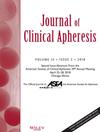I-JAMM (II)—Therapeutic Apheresis Practices in Preconditioning of ABO-Incompatible Kidney and Liver Transplants in India
Abstract
ABO-incompatible transplantations are increasingly gaining relevance with advancements in therapeutic modalities, thus allowing patients to receive timely solid organ transplants. Therapeutic apheresis (TA) procedures remain instrumental as a preconditioning measure to enable such transplants. This survey was undertaken to find out current trends and practices of TA across major transplant centers in India. The survey was drafted by a working group of transfusion and transplant immunology specialists from six different centers in India. Data were obtained via the use of an online questionnaire. Results were categorized into eight categories: hospital information, range of titers for preconditioning, considerations prior to starting TA, TA procedure details, role of pharmacotherapy in TA, policy for reuse of columns, risk of rebound, and the role of transfusion medicine specialists. The survey highlighted the modalities as well as the methodologies of various TA procedures used across different major transplant centers in India. With the increase in ABO-incompatible kidney and liver transplants across the country, the role of transfusion medicine and transplant immunology specialists have become vital in preconditioning regimes enabling the viability and success of such transplants. This was a unique survey that provided us a snapshot of current trends and practices of TA in preconditioning of patients for ABO-incompatible transplants in India.

 求助内容:
求助内容: 应助结果提醒方式:
应助结果提醒方式:


